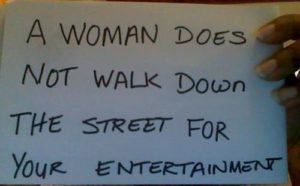Regardless of what a woman is wearing, there’s a high probability she might be catcalled or harassed on the streets. Approximately 99 percent of women experience street harassment, according to a study by Stop Street Harassment.
Holly Kearl, national street harassment expert and author of “Stop Street Harassment”, said the consistent factor in men harassing women on the streets is the fact that women are generally respected less than men are in society.
 “When it comes to men harassing women on the streets, there are several reasons why they do it, but a consistent factor is they feel able to because women are valued and respected less in our society than are men,” Kearl said. “They also know that women typically aren’t going to respond with
“When it comes to men harassing women on the streets, there are several reasons why they do it, but a consistent factor is they feel able to because women are valued and respected less in our society than are men,” Kearl said. “They also know that women typically aren’t going to respond with
anger and fists the way men might if they harass other men, so it’s something they feel they can get away with doing and most do.”
Taylor Damaschi, 19-year-old technical writing student at Arizona State University, said he doesn’t understand why men catcall women because he doesn’t understand how that would win anyone over.
“I don’t think guys do it as a compliment,” Damaschi said. “I think they do it to impress their friends and to selfishly objectify women for their own amusement.”
Catcalling is just a symptom of more severe problems and it translates to a group attempting to obtain power over another group, according to Kearl.
“Street harassment is a symptom of other forms of inequality, sexism, homophobia, transphobia, racism, classism and so forth,” Kearl said. “It is just one more way for people to disrespect and exert power over those they feel are less powerful than them as a result of these forms of inequality.”
Believing that catcalling is harmless or a simple compliment is a common misconception, it degrades women and represents larger ills in society, according to Kearl.
“Street harassment is on the spectrum of sexual violence and on occasion, it does escalate into sexual violence,” Kearl said.
Kearl said talking about street harassment could help shift the cultural norms away from seeing street harassment as a compliment or no big deal to it being seen as a serious problem.
“Talk about the issue, bring forward this often invisible problem,” Kearl said. “Share stories in person or online. Hold discussion groups, community town halls, and city council hearings on the topic.”
 Often times, it isn’t strictly about women as discrimination intersects, involving factors such as race and sexual orientation.
Often times, it isn’t strictly about women as discrimination intersects, involving factors such as race and sexual orientation.
“Work with groups addressing sexism, homophobia, racism, classism, homelessness and sexual violence,” Kearl said. “Find ways to collaborate,
cross-promote, and more comprehensively work toward safe spaces for all. Teach children empathy and how to respectfully interact with each other and that street harassment is not okay, not a compliment, not funny.”
Catcalling has been deeply integrated into society to the point where it is considered commonplace, but it affects and even changes the lives of women, some even alter their daily lives because of it, according to Kearl.
“Gender-based street harassment limits people’s access to public spaces and lowers their comfort level there,” Kearl said. “It can cause people to choose less convenient routes, alter their routines, give up hobbies, change habits, even quit jobs or move neighborhoods or simply stay home because they can’t face the thought of one more day of harassment.”
David Marino Jr., multimedia journalist at ASU, knows an overwhelming amount of women that have experienced street harassment. Marino said he doesn’t believe most men consider it offensive.
“There’s two ways to stop it, the first way is to have it heavily discouraged by society,” Marino said. “Another thing you can do is make catcalling illegal but actually enforce it, like having an officer give a ticket for it. If you said something like that to someone on Facebook then it is harassment so why isn’t it harassment in person?”
Beyond a moment of discomfort, street harassment can shape a woman’s self perception or even trigger a memory of violence.
“Street harassment can be re-triggering to victims of sexual violence and rape,” Kearl said. “It can cause people who suffer from anxiety to stay home. It begins around puberty or in their teenage years for most people, so it impacts their transition from adolescent to adult and how they see their place in the world. It makes people less trusting and willing to talk to strangers in public spaces.”
Damaschi said he believes it deters women from going out and having a good time because they think they might get catcalled or even be led to a violent situation.
“Even the thought that you might get catcalled or have an unpleasant experience already ruins the experience,” Damaschi said. “Catcalling is never a good idea, if men think that catcalling is a compliment or effective at gaining girls’ attention then they are delusional because women think exactly the opposite.”
It might be impossible for a woman to defend herself because a man is catcalling from a vehicle or by simply walking by.
“Usually when it happens it happens so quickly because they’re usually moving, so when I think of something to say back it’s usually too late,” Savanah Yaghesezian, 19-year-old ASU student said.

















